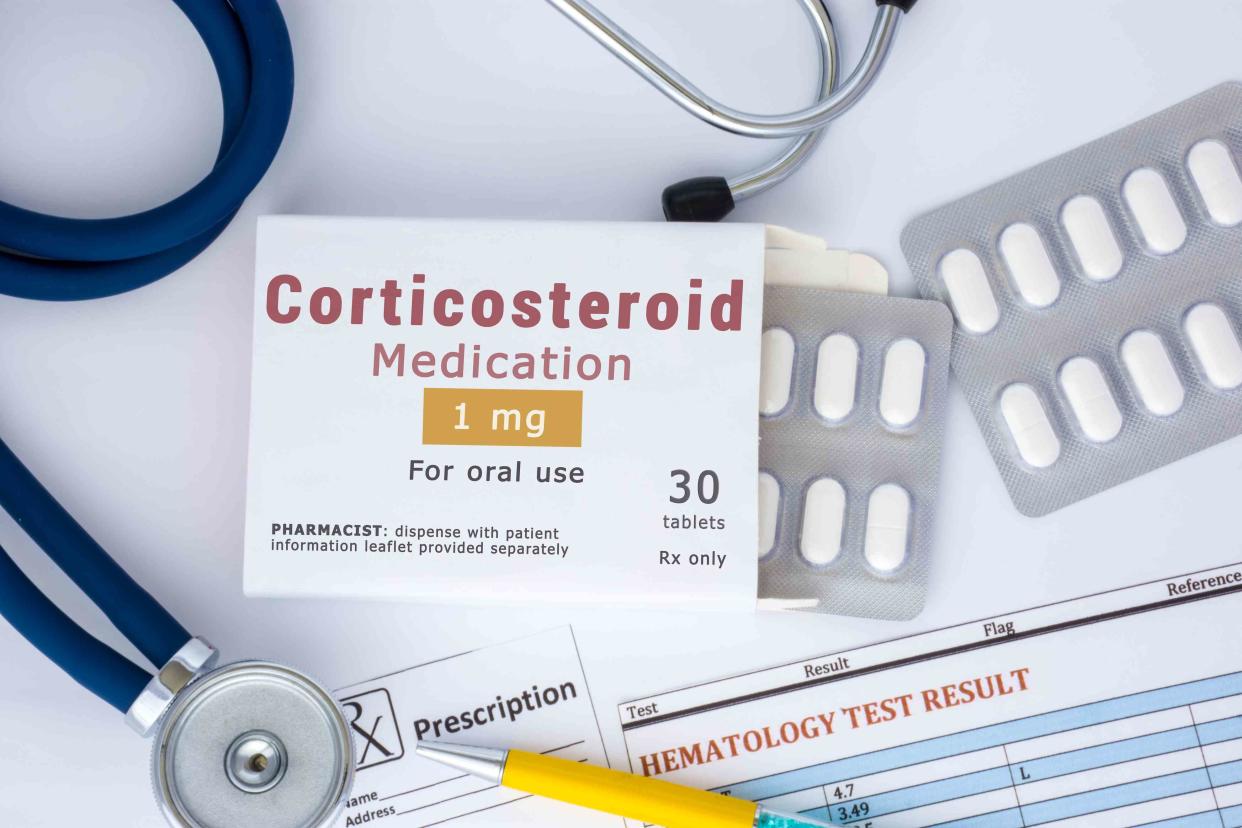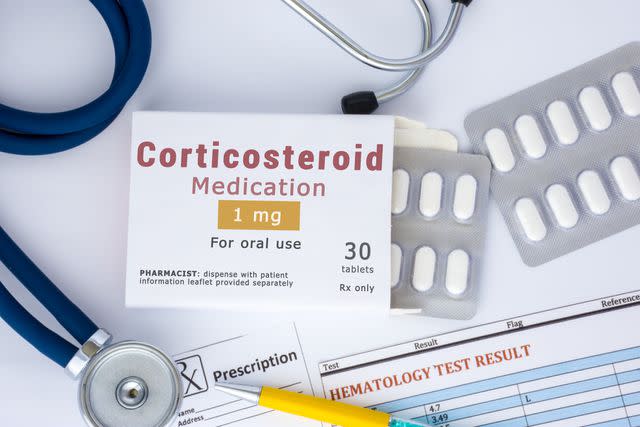The Differences Between Prednisone and Prednisolone

Shidlovski / Getty Images
Corticosteroid medicationMedically reviewed by Femi Aremu, PharmD
Are Prednisone and Prednisolone the Same?
While they are very similar, prednisone and prednisolone are not the same.
They are both corticosteroid medications, also called glucocorticoids or, simply, steroids.
Steroids are used to treat inflammation in many autoimmune diseases, such as asthma, rheumatoid arthritis, and inflammatory bowel disease.
The list of available corticosteroids is long, and many different dosage forms are available.
Prednisone and prednisolone are similar but have some critical differences discussed in this article.

Shidlovski / Getty Images
Corticosteroid medicationWhat Are Prednisone and Prednisolone Used For?
Steroids like prednisolone and prednisone are used to treat numerous medical conditions that cause the following:
Inflammation in the body
Autoimmune diseases (causing the body to attack itself)
Some common uses for prednisone include the following:
Arthritis
Breathing problems, such as asthma
Cancers
Blood disorders, such as idiopathic thrombocytopenia purpura (ITP)
How Do Prednisolone and Prednisone Work?
Prednisolone and prednisone are both synthetic (manufactured) versions of the hormone cortisol.
Cortisol is a steroid hormone produced by your two adrenal glands that sit above your kidneys.
Prednisone and prednisolone are highly similar, but prednisone is a prodrug.
This means after you swallow it, your liver alters the chemical structure a tiny bit to change it into prednisolone.
Prednisolone causes the following effects.
Decreases inflammation: it blocks certain substances from being made that cause inflammation, such as prostaglandins, resulting in decreased swelling, redness, and pain.
Suppresses the immune system: it suppresses your immune system when it attacks your cells by decreasing how many T-cells (a specific type of white blood cell) it makes.
Constricts blood vessels: it tightens dilated blood vessels that may contribute to symptoms such as congestion, redness, warmth, and swelling.
How Do the Dosages Compare for Prednisolone and Prednisone?
| Prednisone | Prednisolone |
Other oral tablets available | Delayed release, brand name Rayos | Orally disintegrating tablet (ODT), brand name Orapred ODT |
Oral liquid brand names | Prednisone Intensol | Millipred, Orapred, Pediapred |
Other dosage forms available | N/A | Eye drop (Pred Forte) |
Typical dosage | 5 to 10 milligrams (mg) depending on condition and severity | Same dosing as prednisone |
What Other Things Can I Do to Help Manage Inflammation in the Body?
Inflammation is essential in the body for some purposes and for short times. Examples include the following:
Responding to injury
Fighting infections
However, chronic inflammation is not beneficial.
But you can help prevent it by maintaining certain lifestyle habits such as the following:
Get at least 20 minutes of moderate exercise per day
Quit smoking
Maintain a healthy weight
Follow an anti-inflammatory diet
Finally, other drugs besides steroids exist that reduce inflammation and include the following:
Depending on your condition and medical history, your healthcare provider may recommend one or more of these options instead of or in addition to steroid medications.
Side Effects & Precautions
Prednisone and prednisolone cause similar side effects as many other corticosteroid drugs.
Side effects are dose-related, meaning they are more likely to occur if you take a higher dose.
They’re also more likely if you take steroids long-term.
It is a best practice to take the lowest dose you need for the shortest time.
Side effects may include:
Edema (swelling caused by fluid build-up)
Hypertension (high blood pressure)
High blood sugar levels
Stomach pain
Insomnia (trouble sleeping)
Mood changes
Headache
Acne
Weight gain
If taken long-term, over months to years, prednisone or prednisolone can potentially cause more severe side effects.
If you’re experiencing any of the following side effects, inform your healthcare provider immediately:
Osteoporosis (weaker bones)
Infection, likely due to the drugs' suppression of your immune system
Severe stomach problems, including stomach ulcers or gastritis
Adrenal gland problems, such as excessive tiredness or muscle weakness
Interactions For Prednisolone and Prednisone
Prednisolone and prednisone have very similar drug interactions. Some of these include:
Jantoven (warfarin) is a blood thinner. When taken with steroids, blood can become too thin or not thin enough. In this case, specific labs, such as international normalized ratio (INR), should be monitored more closely.
Non-steroidal anti-inflammatory drugs (NSAIDs) such as Motrin (ibuprofen) or Mobic (meloxicam), can also cause bleeding issues when taken with steroids.
Diabetes medications such as Glucophage (metformin) or Diabeta (glyburide) that lower blood sugar may need to be increased. Steroids can cause an increase in blood sugar levels.
Diuretics, or “water pills,” such as Lasix (furosemide) and Microzide (hydrochlorothiazide), may decrease your potassium level, which steroids can do as well. Your potassium level should be monitored closely for hypokalemia (low potassium levels in the body).
Live vaccines, like the measles, mumps, and rubella (MMR) vaccine, may not work as well in people taking steroids. It’s best to wait to receive these vaccines until after steroids are discontinued.
If you’ve been prescribed prednisolone or prednisone, ensure your healthcare provider and pharmacist know about all the medications and supplements you take, as some adjustments may need to be made.
Summary
Prednisone and prednisolone are corticosteroid drugs that mimic the action of the hormone cortisol, produced by your adrenal glands.
They are very similar, although prednisone gets converted by your liver into prednisolone after you swallow it.
The drugs have anti-inflammatory and immunosuppressive effects, which help treat many autoimmune diseases.
The list of possible side effects is quite long, so using the lowest dose possible for the shortest amount of time is ideal.
Frequently Asked Questions
Why use prednisolone vs. prednisone?
Prednisolone may be a preferred option if you have moderate to severe liver disease. This is because your liver is required to convert prednisone into its working form, prednisolone.
Can you take prednisolone and prednisone together?
There is no reason to take prednisolone and prednisone together, as prednisone gets converted to prednisolone in the body. Additionally, taking two steroids together can increase the likelihood of side effects generally caused by steroids.
How strong are prednisolone and prednisone compared to other steroids?
Prednisone and prednisolone are mid-strength steroids, similar in potency to methylprednisolone. They are stronger than cortisone and hydrocortisone and weaker than dexamethasone.

